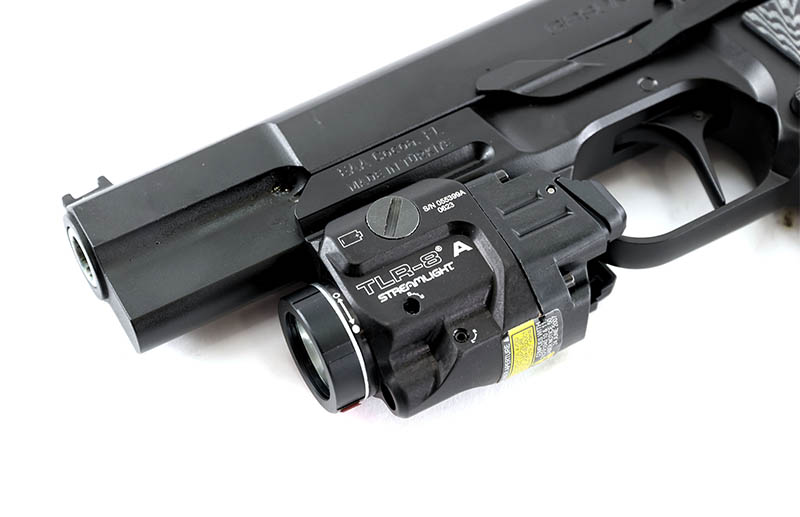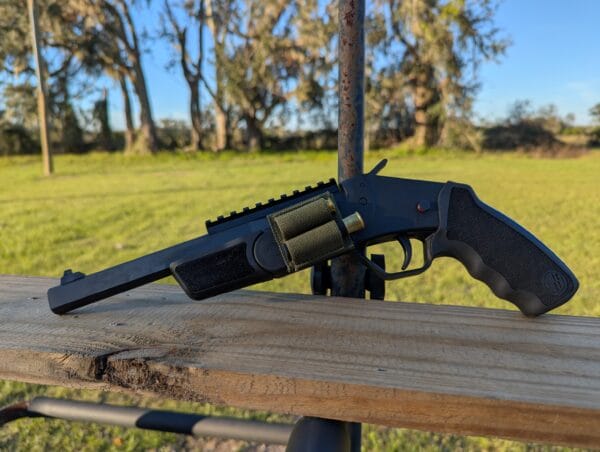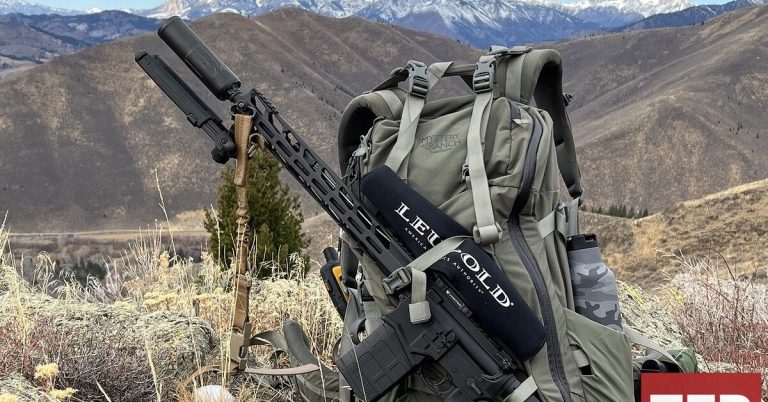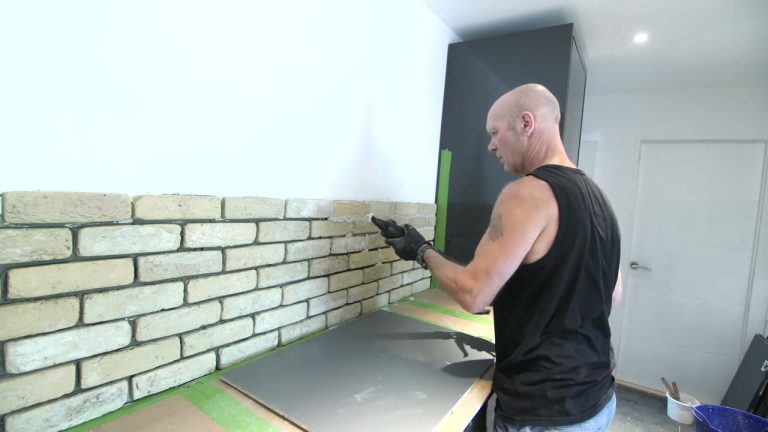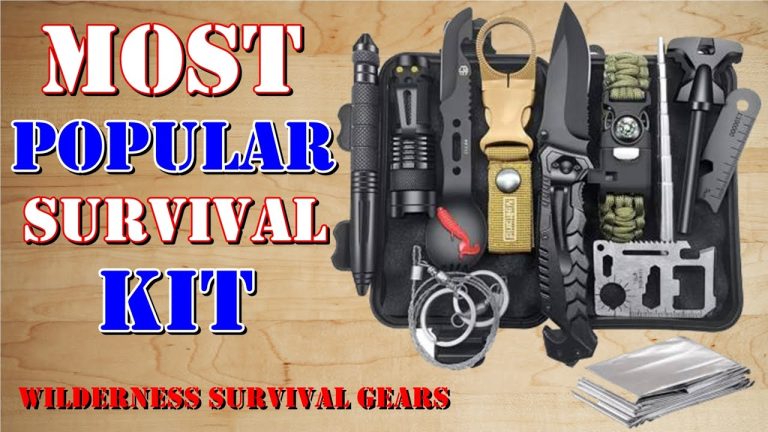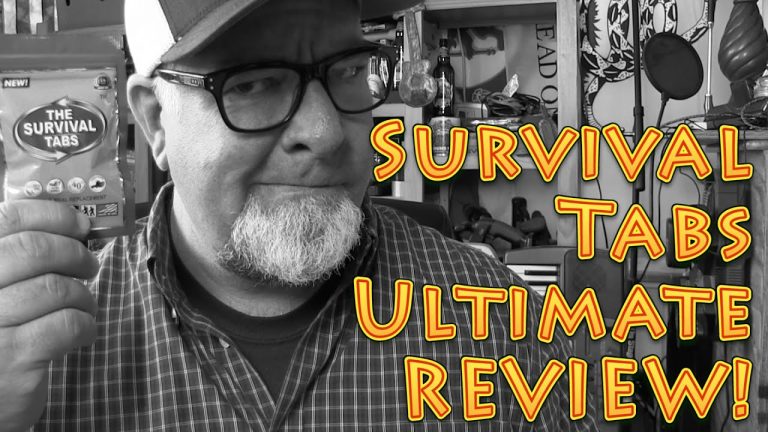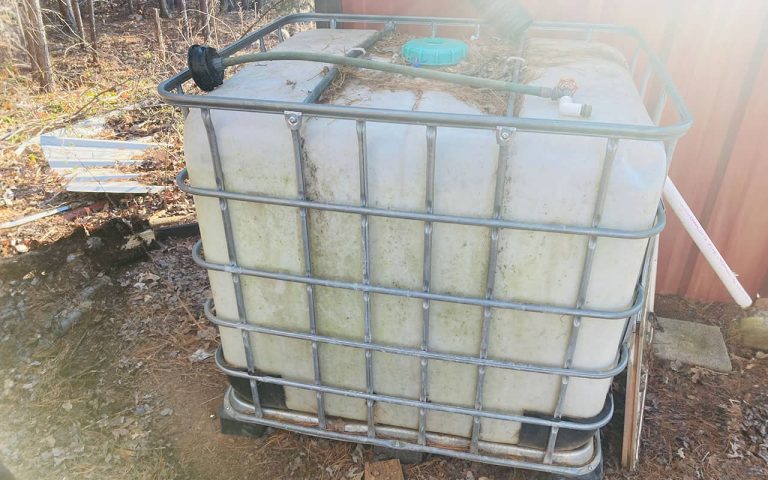These days, nearly every handgun comes with a rail, so here are some top pistol light choices to help destroy the night.
There was a time when it simply wasn’t possible to mount a light onto your firearm. Oh, duct tape, hose clamps and an indifference to tactical fashion could get a flashlight attached to your riot gun or AR-15, but people wouldn’t have called you clever for that—not even back in the 1980s.
Now, it’s rare a pistol doesn’t have a rail for light-mounting, and the choice of lights to mount are near legion.
Streamlight TLR-1
To some, basic is boring. To others, it’s dependable. The TLR-1 isn’t new, it’s not flashy, but it works. And has worked for years. Using a pair of CR123 batteries, it generates 300 lumens of light and continues to do so for two and a half hours. If you’re simply playing the numbers game, 300 might not seem like much, but when it came out that was plenty. And it still is in a lot of circumstances and locations. Indoors, in particular, too many lumens can be a problem. If the predominant paint color on your walls at home is Navajo White, you’re not going to need, nor like, 1,000 lumens.
If, however, you do want to have enough lumen horsepower to signal the mothership, then let’s go up in power.
Streamlight TLR-9
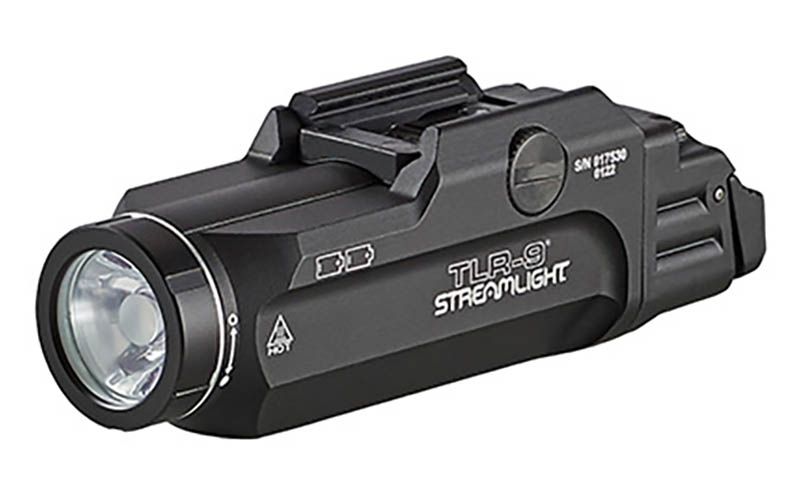
Back in the old days, if we wanted lots of lumens, the choice was the TLR-1HL, a high-output light with 1,000 lumens. You can still have it, but a more modern and better choice is the TLR-9. A thousand lumens, but now in a sleeker package. Instead of side-by-side configuration, the “9” loads the CR123 batteries in line, so you don’t have a fat box under your pistol. This does make it a bit long, but if you want 1,000 lumens for an hour and a half, you’ll need a pair of batteries. It has a toggle/rocker switch at the rear you can reach from either side and a light lock-out feature. This lets you make sure the light doesn’t get switched on when you put it away, only to find the batteries dead some time later. (You do have to remember to unlock it when you next go to load up and carry, but Streamlight can’t do everything for you.)
Let’s take a step back and consider not all lighting options need to be focused on power, even if it means bulk.
Streamlight TLR-8
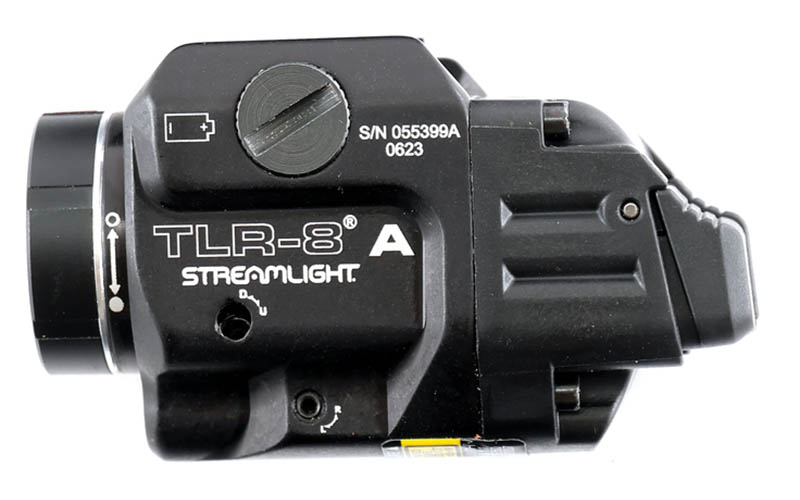
This is a light for compact pistols, but it works on full-sized ones as well. The “8” indicates it’s the light/laser combo, and its companion non-laser model is the TLR-7. It generates 500 lumens and offers a strobe function as well. There are dual buttons on either side of your trigger guard (as mounted), and as with all lights, you’ll have to learn the touch-press-hold pattern that generates the desired function. You have the choice of red or green lasers but not in the same unit. Pick one—that’s the color you get. The TLR-7/8 uses a single battery, the common for lights CR123A battery that’s now an everyday item even in big-box hardware stores.
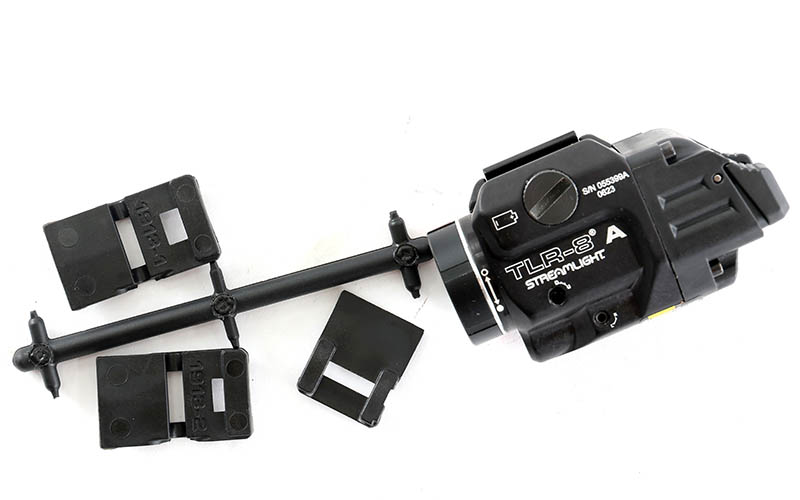
One detail of the TLR-8 (and the 7) that I like is that the light comes with a set of adapter plates. You need to install one of the plates in the body of the light and then fit the light to your pistol. This permits Streamlight to make a single shell with light, battery compartment and controls; by installing a plate, you fit it to your pistol. That means they don’t have to stock a dozen inventory items to fit everything, and you can make it fit whatever pistol you have … or the next one … or the next.
The attachment isn’t fast or overly engineered. It’s a simple screw that pulls the clamp plate on the far side tight to the rail. The slot on the screw has been produced to fit a coin, so whatever pocket change you have will suffice to tighten, or check the tightness of, your TLR-8.
Lights last a long time.
Insight X2
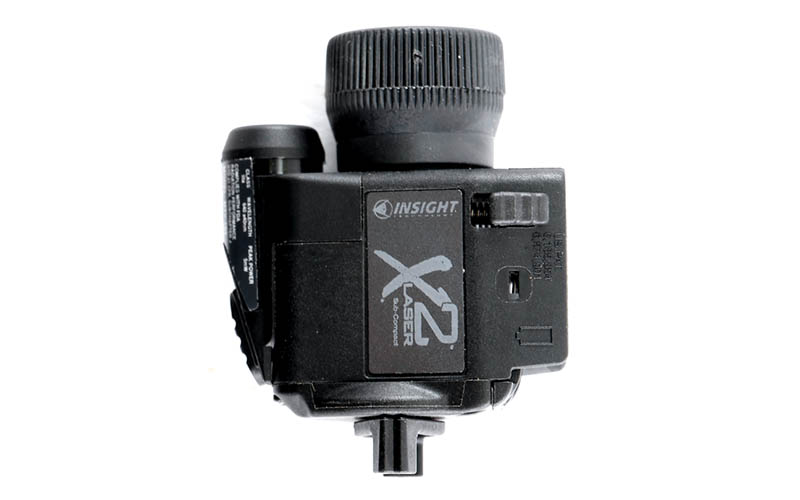
One of my favorite compact lights is the Insight X2, a light/laser combo. The listed light output is only 80 lumens. However, every time I fire it up, I have to ask myself, Who measured that? It punches above its specs. I hang onto it because it hasn’t quit; it’s easy-on, easy-off, fits on everything and produces plenty of light for plenty of applications. Did I mention it fits on everything? If you see an orphan tactical light, don’t pass it up just because it isn’t he newest. New is good, but old can be useful.
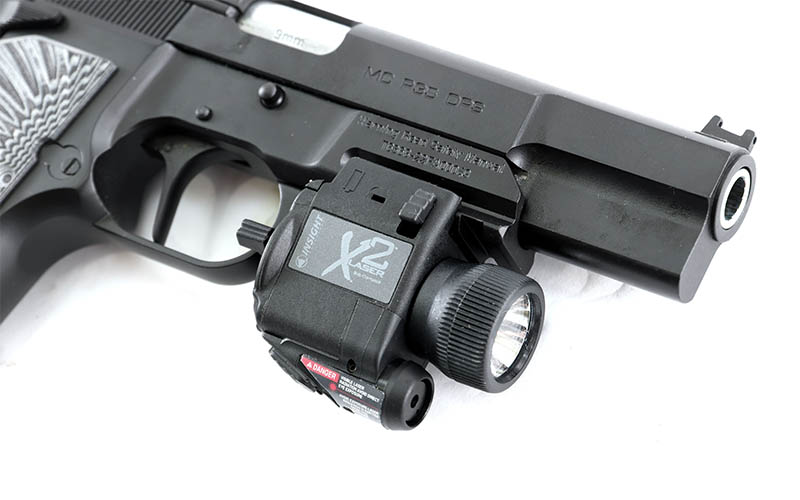
Money matters, so let’s not break the bank while lighting up the night, shall we?
Crimson Trace Lightguard
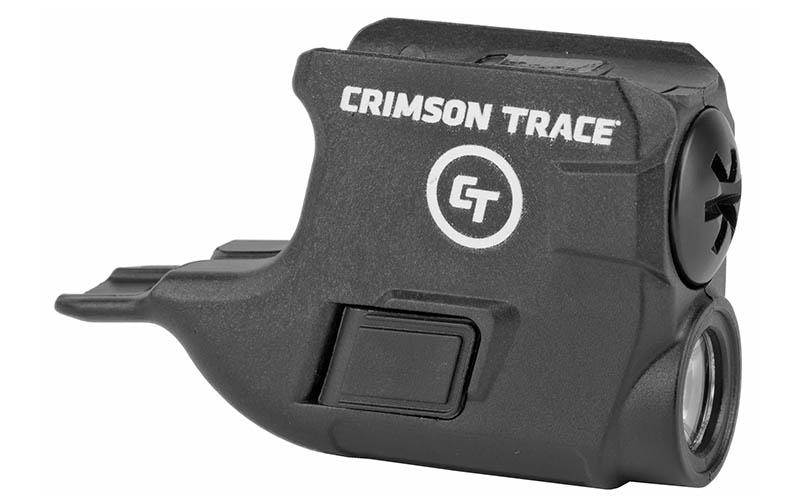
The Crimson Trace Lightguard series doesn’t cover a lot of pistols, only nine models, and they’re not going to get you “what SEALs use” points on your man-card, but not everyone wants to light the dark for any reason other than they have a practical need. The Lightguard series fit onto the trigger guard or accessory rail. They offer ambidextrous controls for momentary and constant-on, and the output, at 110 lumens isn’t going to be laser-like; it’ll show you what’s trying to hide in the dark. Each one comes with the batteries it uses, a pair of 1/3N cells (aka CR1/3N) and will run for an hour on those. With a list price of $90, you can have light on your pistol, even if it’s an older model (one of the nine Crimson Trace makes this for) that doesn’t have an accessory rail.
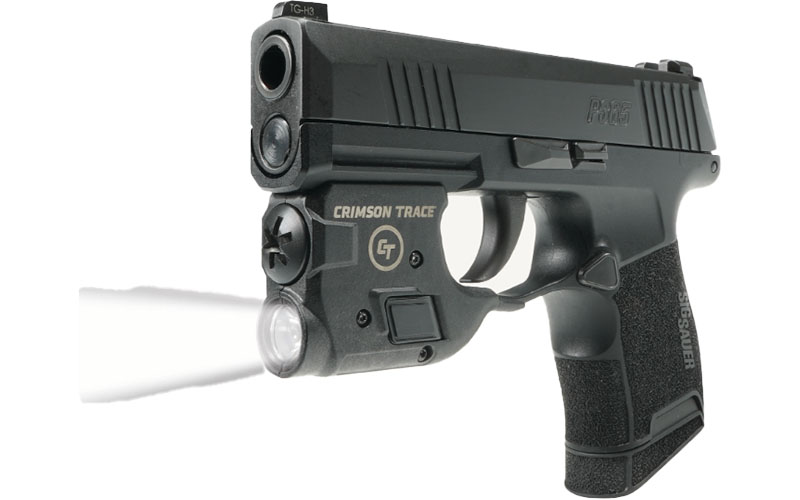
If you have to have the best, the biggest, baddest, most durable light to be had, then we know which aisle to be shopping in.
SureFire X300
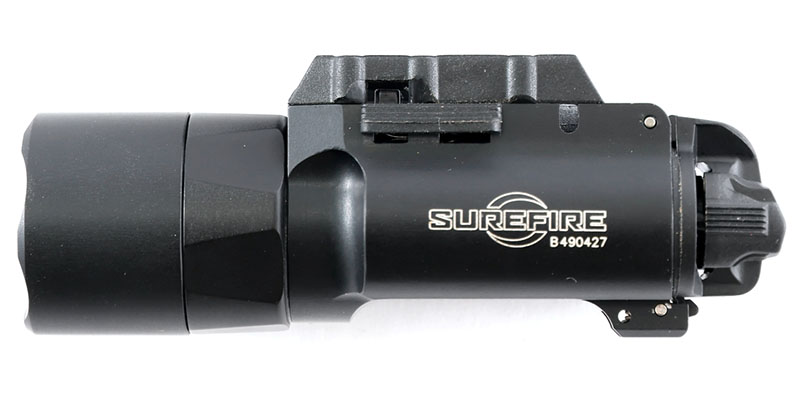
The big daddy of lights—in performance and price—the X300 offers you 1,000 lumens. Now, before we get to gushing over the SureFire light, we again have to consider light. And backgrounds. A thousand lumens is great if you’re checking the exterior of your house, out in the country. (Perhaps a rifle or shotguns might be a better tool …) Indoors, maybe not so much. A thousand lumens, especially if your décor tends toward the lighter colors (or white), can cause a lot of “backsplash.” That’s the excess light you’ve projected out, reflecting off light or bright surfaces and bouncing back into your eyes. Disorienting the bad guy with light is great, but not if you’re doing the same thing to yourself.
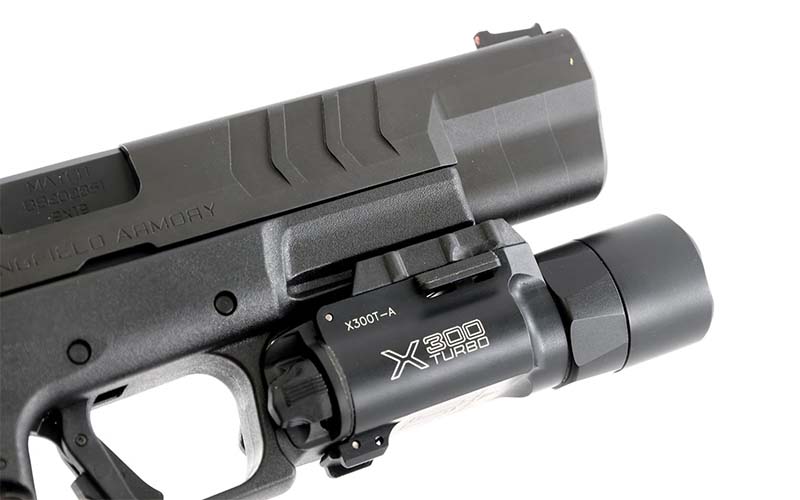
If you have a need for it, and the practice to manage it, the SureFire is king of the hill in pistol lights. It does this with two CR123A batteries, so it’s not as compact as other lights. It offers a quick-attach mount system and can be configured to fit various-sized rails. It’s waterproof to 1 meter for 30 minutes—probably longer than you can hold your breath—and it’s the epitome of solid construction.
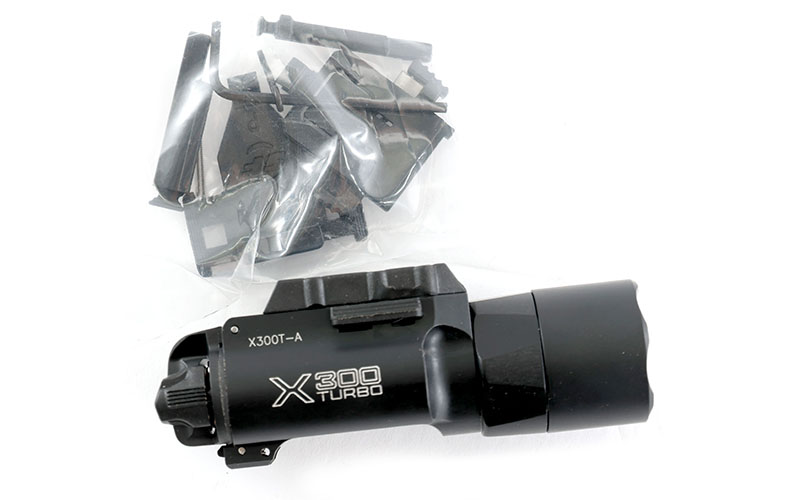
The X300 has toggle levers that are easy to use and work the same on each side of the trigger guard. Those of us with longer fingers find that with some mounting setups we can use the support-hand thumb as the light control.
However, in addition to the extra bulk dictated by the dual batter power (which generates its 1,000 lumens for an hour and a quarter), you also pay for this performance in other ways. At 4 ounces in weight, the X300 is heavier than other lights. It has an extended light housing, making the SureFire itself 3 1/2 inches long. And the price is as much as double that of other lights. But if you want a light no one can speak down on, and want buckets of lumens, Surefire is your go-to.
Spot, flood, “hot,” splash, backup and practice.
Beyond The Lumens
There’s more to light than lumens. Ever wonder why some big bulbs are denoted as spotlights and others as floodlights? Think about it. A spotlight is just that, all (or almost all) of the light generated is focused into a tight circle. Add a pile of lumens to that and you have some interesting reach. With a rifle, in the outside and open, that could be good. If I’m in the country and trying to shoot a problem on the farm at night, a spotlight lets me get a good ID when aiming my rifle. If, however, I want to evenly illuminate the yard or enclosure, I use a floodlight. Weaponlights work the same way.
A “hot” center is a combo, a flood of light, but with a brighter center. You can illuminate the edges, but the bright center is the part lighting up your point of impact.
Splash is light that spills out from where you’re pointing your weaponlight. You must check your local laws, because in a lot, if not all of them, pointing a loaded firearm at someone without legal justification is a crime on your part. One or another variation of assault with a deadly weapon is the charge that’ll be listed, if it gets that far. Even if there are no charges filed, it’ll almost certainly be cause for lifting of your CPL, probably on the subject of “brandishing.” So searching while using a weaponlight as the sole tool of illumination is a fraught proposition. However, with training and practice, you can use the splash from your light to illuminate without actually sweeping someone with your muzzle. It’s not always easy, but it can be done.
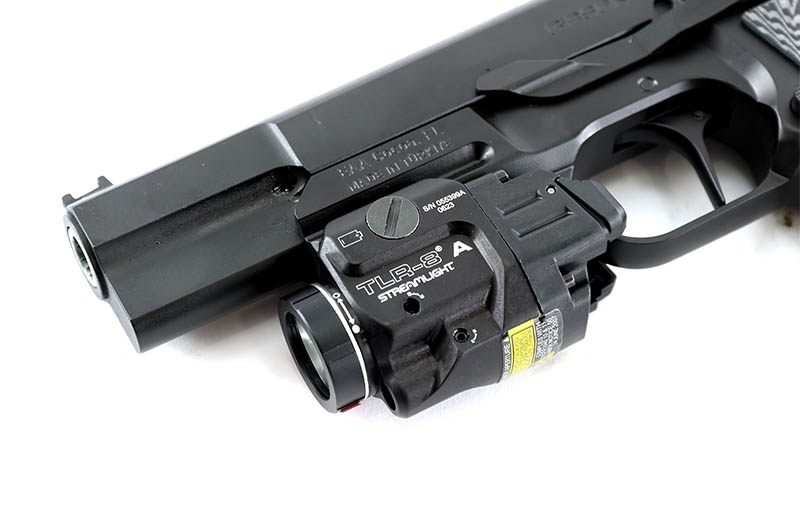
Oh, and batteries? Stock up. There’s not much more discouraging than hearing something go bump in the night and when you go to see what it is, discover the battery is dead. Buying batteries one at a time is just crazy—buy in bulk. A quick check of batter costs showed me that I could get CR123s one at a time for four or five bucks each, but if I bought them by the dozen or more, they cost just $1.50 each. The bigger the bulk, the lower the unit cost, but even I take a long time to grind through 100 batteries.
We use lights at night, but not a lot of ranges let you shoot with the lights out—nor do gun clubs like night-time practice. So, you’ll be doing a lot of your practice in the daytime. Do it and learn to press the light on for what you need as you’re doing the drill you’re doing while shooting. Practice is practice, even if it’s in the daytime for getting ready for the night.
Editor’s Note: This article originally appeared in the November 2023 issue of Gun Digest the Magazine.
More Rifle And Pistol Lights:
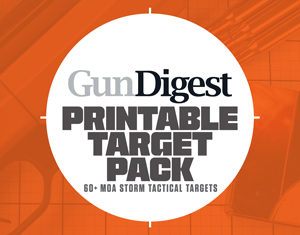
Next Step: Get your FREE Printable Target Pack
Enhance your shooting precision with our 62 MOA Targets, perfect for rifles and handguns. Crafted in collaboration with Storm Tactical for accuracy and versatility.
Subscribe to the Gun Digest email newsletter and get your downloadable target pack sent straight to your inbox. Stay updated with the latest firearms info in the industry.







